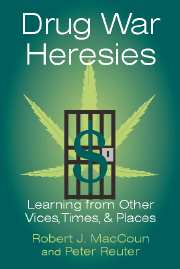1 - Preface and Overview
Published online by Cambridge University Press: 24 May 2010
Summary
PART I: OVERVIEW
Americans have long recognized that psychoactive drugs can create serious hazards for users and others. Yet some see the nation's principal drug problem not as the drugs themselves but rather prohibition and its enforcement. America's highly punitive version of prohibition is intrusive, divisive, and expensive and leaves the United States with a drug problem that is worse than that of any other wealthy nation. Notwithstanding a very substantial investment of resources and of public authority and rhetoric in drug control, there is little sign of major remission in America's drug problems.
It is not surprising then that some advocate a repeal of the prohibition of cocaine, heroin, and marijuana. Legalization has been a politically weak but intellectually powerful influence in American life for the last decade. Its criticism of the current regime has a great deal of truth in it. The most conspicuous harms of drugs currently are those caused by prohibition, namely crime, disorder, corruption, and the diseases related to injecting with dirty needles. From that critique, the legalizers conclude that elimination of prohibition is essential. They assert that legalization would reduce disease, crime, and human suffering.
Arrayed against them, but with a curiously weak representation in the academic and intellectual community, are all the forces of political power. Few basic American policy doctrines are more fervently and frequently affirmed by the President and major politicians of both parties than that the nation must continue to enforce toughly prohibitions of cocaine, heroin, and marijuana as the principal means for reducing their use.
- Type
- Chapter
- Information
- Drug War HeresiesLearning from Other Vices, Times, and Places, pp. 1 - 14Publisher: Cambridge University PressPrint publication year: 2001



